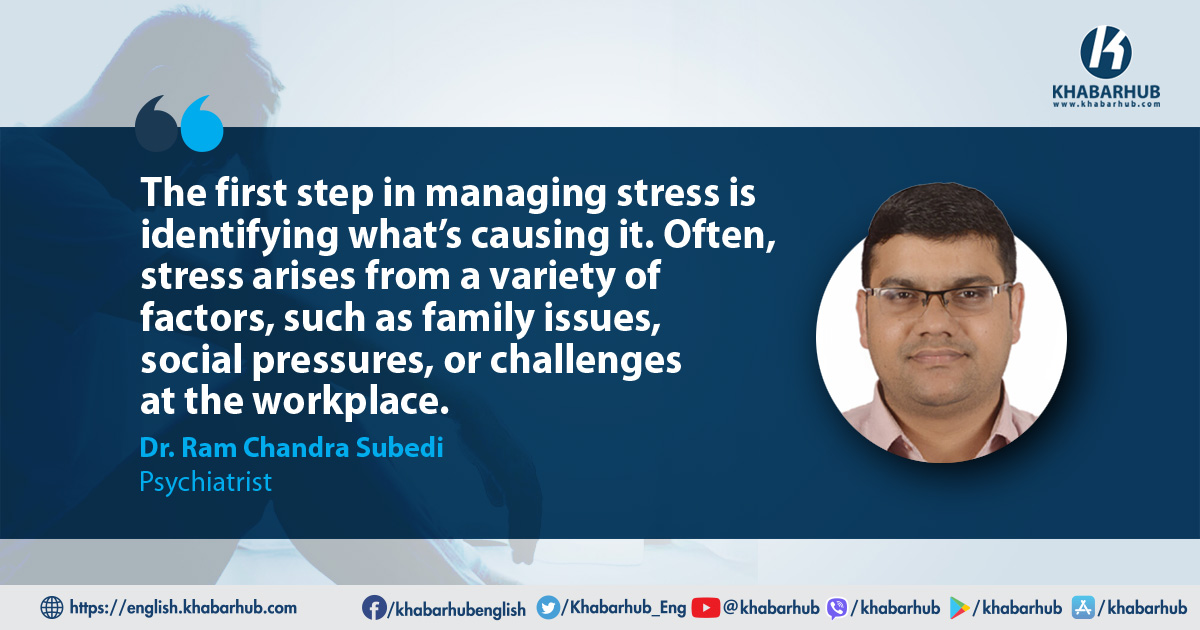KATHMANDU: Stress is the body’s natural response when faced with a difficult situation in life.
It’s a normal process that everyone experiences, especially when starting a new job or moving to a new place.
However, when stress persists for a long time, it can take a toll on both the body and mind.
Doctors emphasize that prolonged stress can lead to serious problems, such as substance abuse, health issues, depression, anxiety, feelings of boredom, and even suicidal thoughts.
To understand how stress affects individuals, its causes, and how it can be managed, we spoke with Dr. Ram Chandra Subedi, a psychiatrist at Grande Hospital.
How do we manage stress?
The first step in managing stress is identifying what’s causing it. Often, stress arises from a variety of factors, such as family issues, social pressures, or challenges at the workplace.
Once the root cause is identified, it’s important to find solutions to those problems.
In addition, practices like meditation, yoga, or engaging in hobbies can be helpful in reducing stress and improving mental well-being.
What are the main causes of stress?
There are many causes of stress, but one of the primary factors is the changing family structure.
In the past, people lived in extended families with three generations—grandparents, parents, and children—all under one roof.
This arrangement allowed for emotional exchanges and problem-solving, offering much-needed support.
However, today’s family structure typically consists only of parents and children, and even then, everyone is often too busy with their own lives to support one another.
The lack of time to connect or listen to each other creates emotional isolation, which can lead to both physical and mental stress.
While living together in a joint family can help manage stress, this is not always possible in today’s fast-paced world.
At what age do mental health issues due to stress appear?
Stress can affect people of any age, though it may manifest differently at different stages of life.
For children, stress might stem from an unsupportive classroom environment, an inability to focus due to distractions, or difficulties with a teacher’s behavior.
For young people, stress often arises when they feel unable to achieve their goals, particularly when their dreams or aspirations are not being realized.
In adults, stress is commonly linked to the pressures of family life. For instance, many young people today are keen to go abroad for work or education, and parents may feel stressed when they are unable to provide the support their children need.
Additionally, the strain of raising children alone, managing chronic health issues, or dealing with financial instability can lead to increased stress.
What problems are caused by stress?
Stress can contribute to various mental health issues, with some of the most common being depression, anxiety, and psychosis.
Depression caused by stress often leads to persistent unhappiness, a lack of energy, and an overwhelming urge to cry.
Anxiety, which often accompanies stress, can cause symptoms such as a rapid heart rate, shortness of breath, excessive sweating, and dizziness.
In more severe cases, stress can result in psychosis, characterized by a distorted way of thinking.
Individuals experiencing psychosis may hear voices, see things that aren’t there, or have negative thoughts that seem irrational—often leading others to mistakenly label these conditions as “madness.”
Who seeks treatment for stress-related mental health issues?
Most individuals who seek treatment for mental health problems caused by stress are adults and the elderly.
However, young women are also frequent visitors to mental health clinics.
In many societies, women face significant stress because they are expected to live according to traditional norms, often neglecting their own desires or career aspirations.
This is especially true for working women who are forced to give up their jobs after marriage or childbirth.
Society often doesn’t recognize that women, too, deserve to live life on their own terms, which can lead to stress and various psychological problems.
The youth of today are increasingly moving abroad in search of better opportunities.
When young people are unable to travel abroad or are unable to find a job after completing their studies, the stress can become overwhelming and may even lead to depression.
For elderly individuals, many find themselves alone at home as their children and relatives move abroad or relocate for work.
These parents, often suffering from chronic diseases, long for companionship, and the isolation intensifies their stress, potentially leading to depression.
What lifestyle changes can help alleviate stress?
The first step in reducing stress is identifying its cause and addressing it. For many parents, stress is often related to the distance between them and their children.
In such cases, it’s important to think about how to create an environment where families can live together and maintain strong connections.
Unemployment is another major source of stress, especially for young people. Whether in public service or another field, it’s essential to have alternative options in place.
If we focus on just one goal and fail to achieve it, stress can build up. Therefore, it’s important to have multiple priorities or options. If one path doesn’t work out, we can move on to the next.
For children, it’s crucial not to force them into careers or fields of study that don’t interest them.
For instance, a child passionate about sports should not be pressured to become an engineer.
Similarly, just because a child excels in academics doesn’t mean they should automatically pursue a career in medicine.
If someone has an interest in music or any other field, they should be encouraged to explore that path.
A family and society that provide support and understanding can help create long-term solutions to stress.
How aware is society of mental health issues caused by stress?
As education levels rise, awareness of various health issues, including mental health, is gradually improving in society.
Many patients now seek help after researching their problems online. However, there are still individuals who avoid seeking treatment out of fear of judgment from their community, especially when it comes to taking medication for mental health issues.
It’s essential that both the public and the government recognize mental health problems as legitimate diseases, just like physical illnesses.
Raising awareness about the importance of timely treatment is critical, as untreated stress-related issues can lead to both physical and mental health problems down the line.









Comment